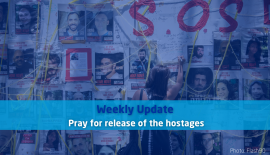Birth of the State of Israel
We need to learn from what has happened in the past; see how Israel’s originally allocated commitments & borders have changed, regardless of all International promises and agreements…How did it all happen?
1920 – 1946 The British Mandate. Under the terms of the Mandate, Britain’s principle obligation was to facilitate the implementation of the Balfour Declaration of November 2, 1917, which pledged and commited: “the establishment of a national home for the Jewish people“
1922 – 1946. In July 1922, the British divided Palestine into two administrative districts. Jews would be permitted only in the west side (east of the Jordan river). In 1946, the British had partitioned Palestine and created an independent Palestine-Arab state – TRANS JORDAN, before it was called JORDAN. For more info go to: ![]() https://www.cia.gov/library/publications/the-world-factbook/geos/JO.html
https://www.cia.gov/library/publications/the-world-factbook/geos/JO.html
November 1947. On November 29, 1947, the General Assembly of the United Nations voted with a 2/3 majority to partition western Palestine into a Jewish and an Arab state. The Arabs rejected it. The Mufti of Jerusalem, Haj Amin Al Husseini stated: “I declare a holy war, my Moslem brothers”. “Murder them all!”
On May 14th, 1948, Prime Minister David Ben Gurion read the ‘Declaration of Independence of the State of Israel’. The age-old dream finally had finally become reality. As David Ben Gurion read the Declaration of Independence, the new land received again its old Biblical name Israel. Until that moment the land had been called Palestine, the name the Roman emperor Hadrian gave, in a dire efford to whipe out the name of ISRAEL, 1800 years before.
David Ben Gurion stated: “The state of Israel will be open to Jewish immigration and to the coming home of our exiles. Israel will develop the country for the sake of its inhabitants, it will be founded on the teaching of freedom, justice and peace, according to the visions of the prophets of Israel, it will promote the full social and political equality of all its citizens, without any distinction in faith, race or sex, it will guarantee the full freedom of conscience, religion, education and upbringing, it will hold dear the holiness and inviolability of the holy places of all religions, and it will be loyal to the principles, as written down in the Constitution of the United Nations.”
Only a few hours after the Declaration of Independence, five Arab countries, the armies of Lebanon, Syria, Jordan, Egypt and Iraq attacked the newborn Israel to try to eliminate the ‘Zionist Agression’. By the Grace and plan of God, The new Jewish state survived.
1948-9: The War of Independence
The Arab neighboring countries refused to accept that Israel was an independent state. In the following thirty years five wars would follow. The Independence War commenced in May 1948. Less than a day after the declaration of the state of Israel, the armies of Egypt, Jordan, Syria, Lebanon, Saudi-Arabia and Iraq attacked the small state of Israel. In 1949 the war came to an end. Israel signed a suspension of arms with Egypt (no peace). After the suspension of arms, hardly one day passed without clashes. A cease-fire also followed with Lebanon, as well as with Jordan. Syria was the last country to lay down its arms, and retained the Golan Heights. Israel’s goal was to come to a peace agreement with its neighboring countries, but this was not the idea of the Arabs. They refused to acknowledge the Jewish State. The United Nations, on the contrary, did.
Just before and during the Independence War (1948-1949) many Palestinian Arabs – about 650,000 people in total – fled the land. These were different groups of Arabs, each with their own reason to leave the country. The great-mufti of Jerusalem, who collaborated with the Nazi’s and the governments of the Arab countries, incited many Palestine Arabs to abandon Israel and to go to the Arab neighbors. The refugee problem was and still is very complex, and is remains a major issue in the negotiations for peace.





